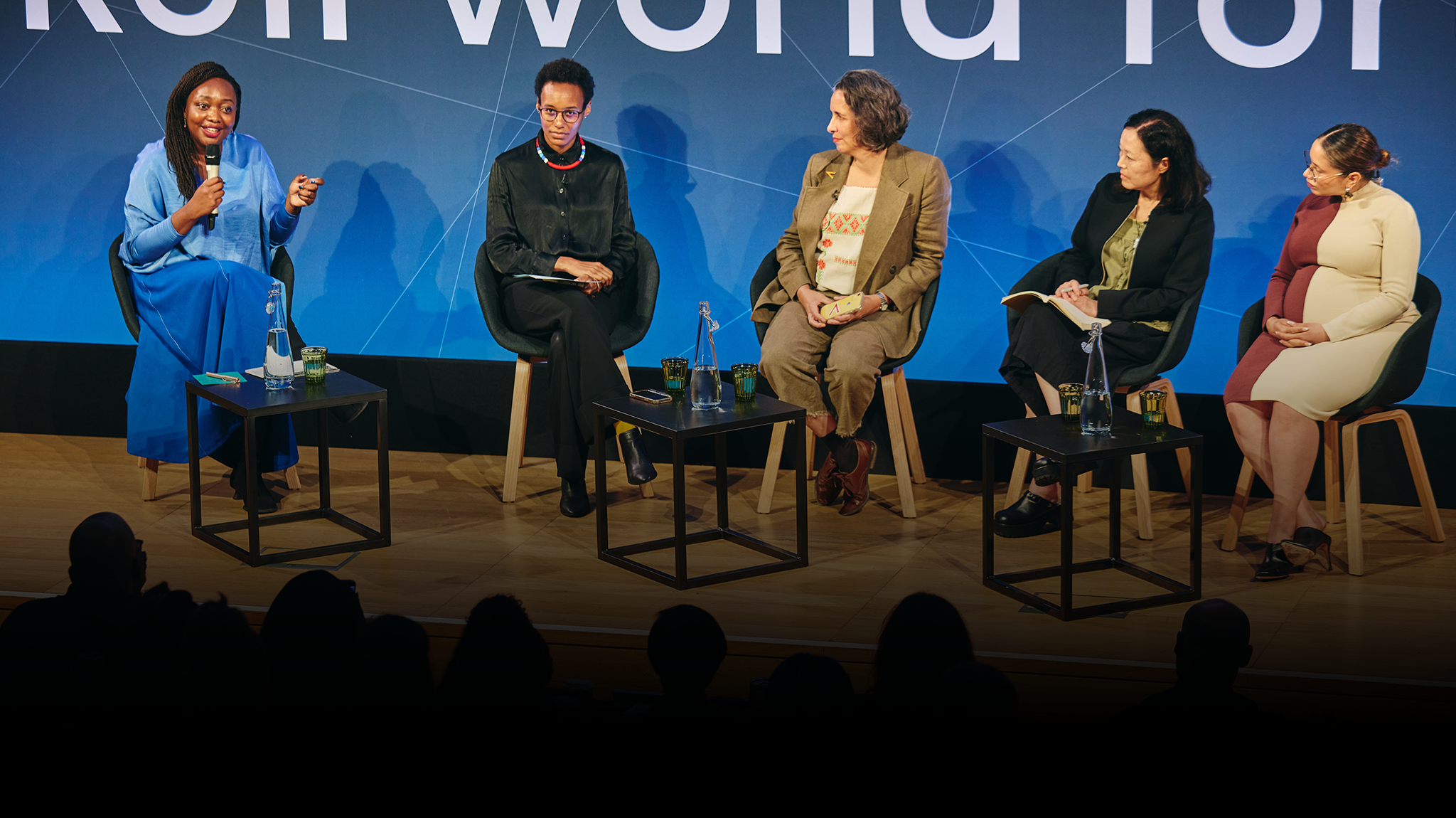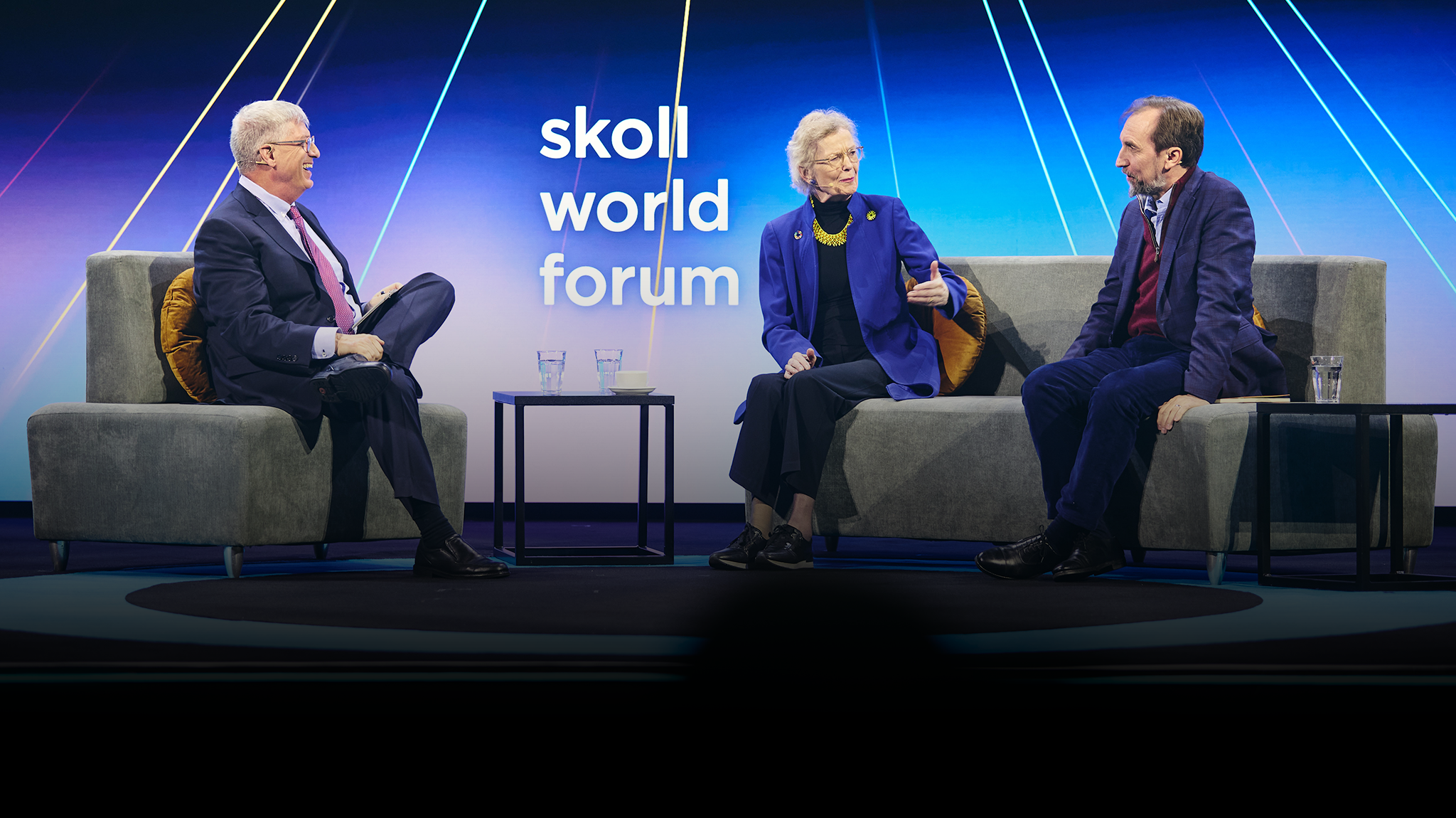We The Future Spotlights Bold Models for Sustainable Development Agenda
Last week, a group of social entrepreneurs, corporate pioneers, and policy innovators gathered at the TED Theater in New York during Global Goals Week for We The Future: Accelerating Sustainable Development Solutions. The Sustainable Development Goals are a dramatic restructuring of the status quo—a daring vision—one that demands ambitious partnership across sectors. During a week of ponderous discussion of intractable problems, We The Future put the spotlight on solutions and the role of social entrepreneurship to advance progress towards the SDGs.
Incremental change won’t get us there–we’ll need to think on a far more grand scale, and seize on the solutions that are already working. Rather than focus on each of the 17 SDGs during We the Future, speakers explored four cross-cutting strategies for change that the Skoll Foundation has seen emerge in its portfolio: data-driven approaches, innovative finance, behavior change, and investing in human capital.
The four keynotes pushed beyond that thematic structure, with a focus more on transformative thinking and systems-change level action. Astro Teller (Captain of Moonshots, X) joined Julie Hanna (Executive Chair of the Board, Kiva) in a discussion of radical action to drive big change. The SDGs are moonshoots, says Teller, and those working towards them need not think about 10 percent improvements of problems, but 10 fold changes in a status quo.
Moonshots don’t take a lot of money but bravery, creativity and scrappiness-Astro Teller @astroteller #WTFuture #SDGs pic.twitter.com/KoQUJHiuMi
— AlisonOWheeler (@AlisonOWheeler) September 21, 2017
California Governor Jerry Brown joined Sally Osberg (President and CEO, Skoll Foundation) in a conversation about leadership on climate change policy. “If we keep going on the path that we’re on now, we face apocalypse,” Brown told Osberg. “We can’t be complacent.”
During #ClimateWeek Governor of California @JerryBrownGov discusses vision and action in a changing climate with @SallyOsberg at #WTFuture pic.twitter.com/SblAKnnQwZ
— Skoll Foundation (@SkollFoundation) September 21, 2017
Muhammed Yunus (Nobel Prize Laureate; Co-Founder, YSB Global Initiatives) presented his vision for a radically redirected economic system with zero poverty, zero unemployment, and zero net carbon. “With the lens of a social business, you’ll see creative power in addressing an issue in a sustainable way,” said Yunus. “You’re operating a business to get the money back and solve the problem.”
Prof. Yunus: “Econ system sucks all from the bottom – gives to the top –#inequality is a time bomb” #WTFuture @SkollFoundation @TEDTalks pic.twitter.com/F6mPP7XVK8
— Chris Jochnick (@cjochnick) September 21, 2017
The Elders Mary Robinson (Former President of Ireland, Former UN High Commissioner for Human Rights) and Ernesto Zedillo (Former President of Mexico) joined in conversation Emmanuel Jal, a musician and activist who was a former child soldier in a discussion of the centrality of peace to all social progress and each of the SDGs. “Peace is everyone’s day job,” said Jal.
Without peace and rule of law, there is no safety for people and development becomes impossible. – Mary Robinson of @TheElders #WTFuture pic.twitter.com/1NKauEc5PU
— Mabel van Oranje (@MabelvanOranje) September 21, 2017
The day’s discussions featured the courageous and impactful work of several Skoll Awardees and other innovative leaders pushing towards the vision of a peaceful, prosperous, and sustainable 2030. Gillian Caldwell (CEO, Global Witness) gave a powerful TED-style talk on how data fueled Global Witness’s investigation into Myanmar’s extractive jade industry that siphons out nearly half of its potential GDP.
“Open data helped us to determine who was getting rich off #Myanmarjade” – our CEO @GBCaldwell speaking @unfoundation @SkollFoundation today pic.twitter.com/t2EES68Ooa
— Global Witness (@Global_Witness) September 21, 2017
Josh Nesbit (CEO, Medic Mobile) delivered a talk on how “human-machine teams” of empowered community health workers are the future of global health. “When we think about humans and machines as a team, we’re freed up to focus on strengths rather than shortcomings,” said Nesbit.
“We must design with deep respect for humanity, actively bring humanity into technology and putting people first”- @joshnesbit #WTFuture pic.twitter.com/4VBDkFaEFY
— Medic Mobile (@Medic) September 21, 2017
Dolores Dickson (Regional Executive Director, Camfed West Africa) delivered a talk on the exponential ripple effects of girls education and how beneficiaries become changemakers, champions, and valuable mentors. “This is the multiplier effect of girls’ education,” said Dickson. “This is how we can transform a continent.”
Multiplier effect of girls’ education can change a continent @Camfed #WTFuture #GlobalGoals pic.twitter.com/uAdi6LyZjD
— Anna Zimmermann Jin (@azimmermannjin) September 21, 2017
Debbie Aung Din (Co-Founder, Proximity Designs) showed how farmers in Myanmar are empowered with human-centered design—bringing them into the product design process and treating them as customers, not charity. “We need to be open and flexible and not be afraid to make huge changes,” she said.
“It’s important to work at the macro and micro level to produce change” Debbie Aung Din of @ProximityDesign#WTFuture
— Skoll Foundation (@SkollFoundation) September 21, 2017
Mindy Lubber (CEO and President, Ceres) led a conversation with Mehmood Khan (Vice Chair and Chief Scientific Officer, PepsiCo) about behavior change in a corporate context–how business leaders can change business practices to embrace climate risk as core to success. “When it comes to climate change, we must realize it’s not just an environmental issue,” she said. Khan offered his vision for top down leadership on the issue. “There should not be a sustainability officer in any business,” he said. “Let’s get rid of that role. It must start with the board of the company and be truly embedded in the core of the organization.”
“Unless it’s embedded from board room to supply chains, where everyone is thinking about human rights & #ClimateChange, it doesn’t happen” pic.twitter.com/mMPCvWbObv
— Skoll Foundation (@SkollFoundation) September 21, 2017
You can watch all of these provocative and inspiring talks—as well as the full programming of We The Future—by clicking through this playlist. It was an unforgettable day, and we have no doubt that this convening emboldened tireless efforts towards the SDGs with renewed energy.
Getting down with @EmmanuelJAL as we close out #WTFuture! https://t.co/ItcmMe5nNH @unfoundation @TheElders pic.twitter.com/LkUniNr92R
— Skoll Foundation (@SkollFoundation) September 21, 2017



